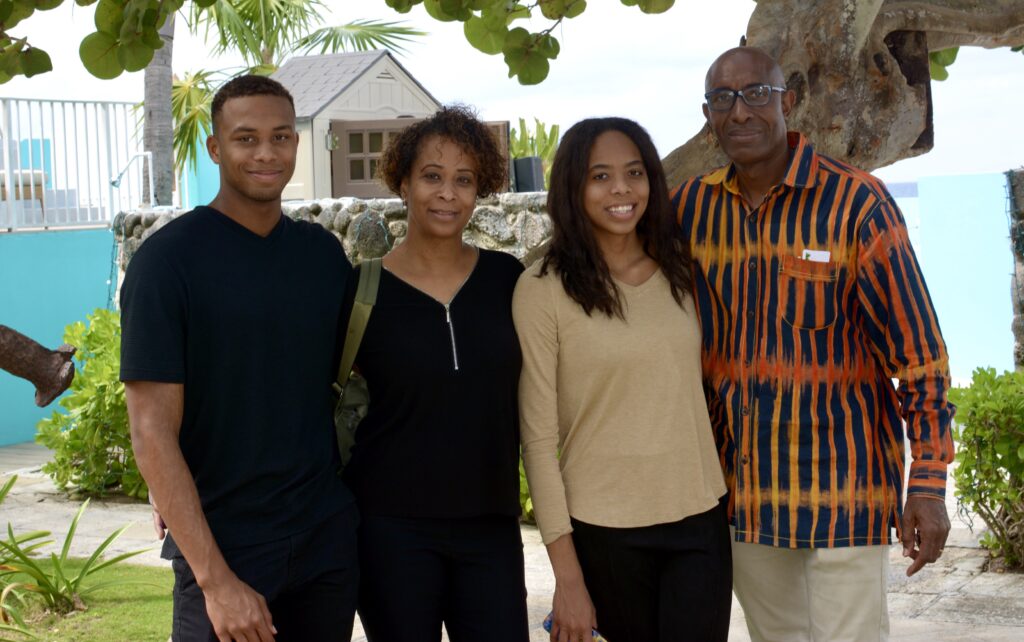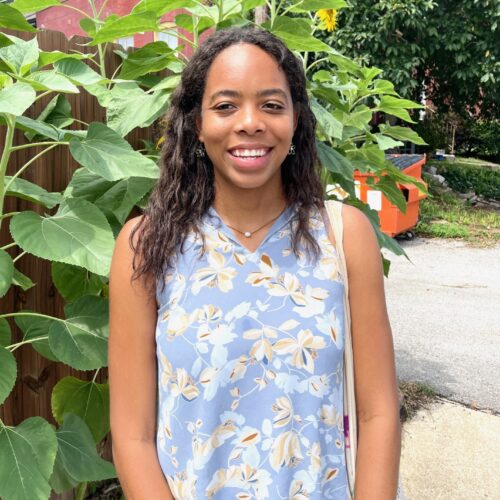Samara Wilson is a junior in Arts & Sciences, majoring in economics and American culture studies with a minor in business of entertainment.
She’s also a Bear Ambassador and tour guide for admissions. She spent summer 2023 in St. Louis as an intern in University Advancement and as a residential program assistant for pre-college programs at WashU. A native of rural Trinidad and Tobago, she hopes to work in economics after graduation.
What drew you to WashU?
There were three main things. The first thing is just how interdisciplinary it is. I really appreciated how WashU lets you take classes from different schools or double major and minor across from schools. And not only is it allowed, but it is encouraged. Second, WashU is so collaborative. People like to work together on things, and people work with you, not against you. And third is St. Louis itself. I am from a rural area of Trinidad and Tobago, so I wanted to live in a city but not be too overwhelmed. St. Louis is the perfect size for a student who isn’t used to living in a city: there’s always stuff to do but it’s never overwhelming.
What is an experience you’ve had that you think only would have only happened at WashU?
Last semester I was part of a program called the Chancellor Career Fellows. It’s a one-credit class for lower and limited-income students, and we discussed things like how to use LinkedIn and how to look for internships. We attended a career fair together. And having that opportunity with a small class size was really helpful. At the end of the semester, we all received a stipend to cover summer expenses so we could afford to do internships. That’s just one example of many programs that WashU has. I feel like they care about all students and want to make sure that students have access to opportunities that are not dependent on their income.

I’m also in the Beyond Boundaries program. I appreciate having a cohort of other students who have that interdisciplinary mindset, even if they aren’t studying the same things as me. Also, I remember even before I committed to WashU, the program’s director, Rob Morgan, called me personally to welcome me into the program. That was one of the initial times I was like, “Wow. WashU’s motto of knowing students by name and by story isn’t just words, it’s actually put into practice.” And it continued, having him as a mentor not only for Beyond Boundaries, but also connecting me to resources was really helpful.
What is your favorite spot on campus?
Even though I’m not in the engineering school, I love studying on the second floor of McKelvey Hall. You get a really nice view of the east end. There’s Starbucks right downstairs. And a bunch of different groups of students study there as well. So, I love the combination of the setting and the feeling of studying with a bunch of other people, even if they’re studying something else.
Who are the professors who have made your WashU experience special?
This summer, I was part of a program called On Location, which takes students on a traveling course with two professors. This course was offered as part of the American culture studies major by Geoff Ward, Professor of African and African-American Studies, and Paige McGinley, Director, Program in American Culture Studies. About 12 of us went with them to Charleston, the Sea Islands, and Savannah. We all lived together in mid-May and early June, and we learned a lot about Charleston’s history and its relationship with slavery, and for me, it was an introduction to the Gullah Geechee people and their culture. And it was a really cool opportunity to kind of get to know professors on a level that I probably wouldn’t have even if I took a whole semester’s worth of classes with them. They were so supportive and knowledgeable, and they provided many resources and such great constructive criticism. I’m definitely going to keep in touch with them after graduation.
What kind of clubs or extracurriculars do you participate in?
I’m part of Strive for College Mentors. We help students from City Academy in St. Louis. My first year we went to their school to work with students, but this past academic year we started bringing the students to campus, which is cool because they get to experience WashU. It’s a mix between informing the students about college and helping them with their school work and things like time management skills.
With all of the causes and organizations to choose from, why do you think people should give to WashU?
WashU believes that a student’s financial status shouldn’t hinder them from any opportunity available to them. I think they really try to put everyone on a level playing field and give students who are low-income or limited-income opportunities so that they’re able to achieve the same things that their peers can. I think about financial aid, and I think about all the other programs I’ve been part of, such as the Career Fellows program. I think about the On Location program. I was able to participate because it was fully paid for me – I wouldn’t have been able to have these experiences otherwise. So, when people support WashU, the university can continue providing all these amazing opportunities for students.
